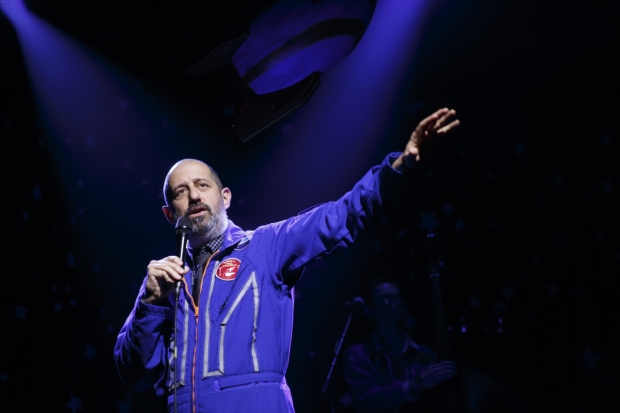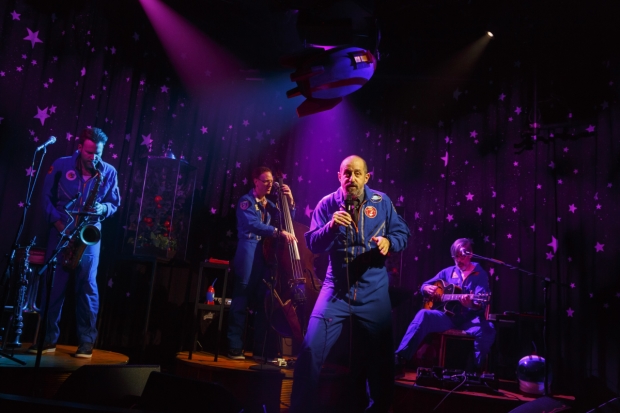The Outer Space
Ethan Lipton’s new show at the Public Theater is a little bit country, a whole lot NPR.

(© Joan Marcus)
Ethan Lipton and his orchestra take the stage of Joe's Pub dressed in blue flight suits. With a star curtain behind him and a bulbous blue and orange model spaceship fit for Buzz Lightyear hanging above him, Lipton looks like the front man for the band at a space-obsessed child's birthday party (whimsical scenic and costume design by David Zinn). Of course, this is a show for grown-ups, as evidenced by the martini glasses scattered through the audience. Despite its cutesy and inoffensive veneer, The Outer Space deals with some of the most difficult decisions we make in our adult lives.
Bridging the divide between solo theater, cabaret, and science fiction, The Outer Space follows the story of a man and his wife. The wife has become fed-up with how expensive and cramped Earth has become; she determines that they should rocket off to a space colony orbiting Mercury. The husband is not so sure he's going to like space. He's also not happy with how all their income seems to go into their money pit of a spaceship (which, we are told, is Victorian in design). But she makes it very clear that if he returns to Earth, he's going alone.
Slowly but surely, he begins to appreciate little aspects of space living: Hermetically sealed glass cases growing what look like heirloom tomatoes flank him onstage. The denizens of the space colony partake in yoga and podcasts. Several of them run B&Bs, although no one seems to like the people who just come to space for the weekend. As the evening goes on, space begins to sound a lot like upstate New York.
This isn't the first time Lipton has used space as a metaphor for the universe beyond Gotham: His 2012 show, No Place to Go, was about a man whose job relocates to Mars (the lyrics suggest this is a continuation of that space odyssey). While the loss of employment could not convince his everyman character to slip the surly bonds of Earth in that show, a terrifying development changes things in The Outer Space: the forward march of real estate conquistador Barbara Corcoran.
Remarkably, Lipton is able to sustain this thinly veiled allegory through a gentle deadpan delivery. His dulcet growl is reminiscent of Garrison Keillor as he tells us about the various cyborgs and rare book enthusiasts who inhabit this space-age Lake Wobegon. And like Keillor, Lipton garnishes his tale with an eclectic mix of musical styles, all of them distinctly American.
He croons like Hank Williams on the song "Grumpy," about the odd satisfaction found in irritable misery. The rollicking "Yoga" has more of a rock-pop vibe. Other numbers incorporate elements of Latin and jazz music, all expertly performed by the three other members of his band (dexterous guitarist Eben Levy, steady bassist Ian M. Riggs, and one-man woodwind section Vito Dieterle).
Like a good lead singer, Lipton accents each song with his unique physicality, which is as idiosyncratic as his musical tastes. He shuffles his legs back and forth like a tiny Tina Turner in "Current Set of Problems." He later flaps his arms like an arthritic chicken during "A to Z," a song about how differences bring people together. Director Leigh Silverman accentuates Lipton's natural charisma in her straightforward concert staging, in which all four band members remain in formation throughout, staring out at the audience in a manner that would seem confrontational if it weren't so regularly warm and fuzzy.

(© Joan Marcus)
At first glance, this jovial evening of story and song doesn't ask much, but if you listen closely, you'll notice that it brushes against the most personal of questions for New Yorkers: When will you admit that the rat race you found so intoxicating as a twentysomething is tiresome and fruitless? Wouldn't you rather drive to work in your Volvo than cram into the subway like a sardine? But when you get to outer space, won't you miss life back on Earth? As The Outer Space shows us in its own tuneful way, dissatisfaction is by no means a condition endemic to this planet.









